This post may contain affiliate links. That means if you click and buy from that link, I may receive a small commission (at zero cost to you), which helps me maintain the quality of this blog. Please see my full disclosure policy for details.
Replacing your footwear often is essential for obtaining optimal foot health. The question you have is how long should shoes last?
Many of us are guilty of wearing a pair of shoes that are way past their expiration date. This is often down to a lack of awareness regarding the problems with worn-out footwear.
A clear warning sign that your shoes are approaching the end of the road is if they feel less comfortable. Perhaps they don’t deliver the same support, or maybe your feet are feeling more tired after work.
I have worked as a footwear manager and store manager in shoe stores for five (maybe six) years. I have served thousands of customers that had to replace their shoes. So I know what they complained about, what they didn’t know, the state they had their shoes, and any problems created because the shoes weren’t suitable anymore. That’s why I feel I am the right person to answer the question: how long should shoes last?
What You Need To Consider About How Long Shoes Last
You still need to consider some things when looking at how long shoes should last. Of course, everyone’s situation will be different. A good pair of shoes can last for many years or can be worn out in a matter of months depending on your walking habits and how well you take care of them.
Read: How Many Pairs Of Shoes Should a Man Own?
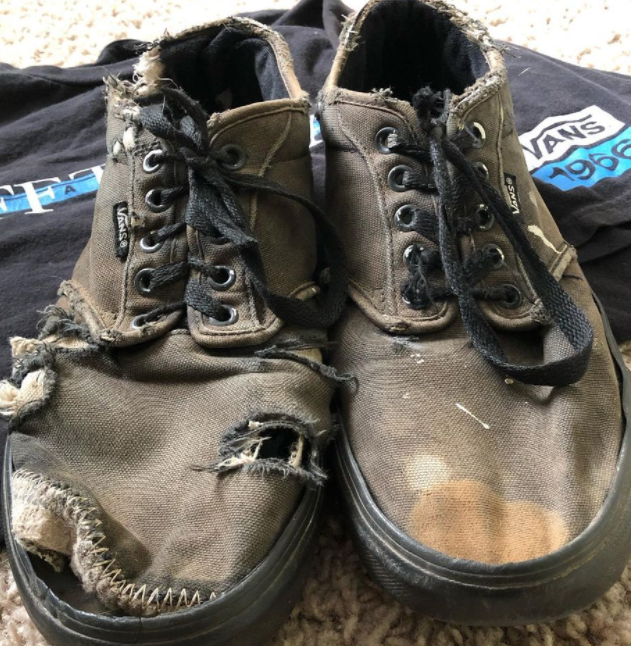
How Often Do You Wear The Shoes?
If you wear the same shoes every day, you aren’t likely to get as much life out of them as someone who wears a different pair every day.
I have used a pair of running shoes every day for everything from walking, working, running, or go to the supermarket. But, after three months, I could feel they were gone (the cushioning was gone). This is why it is essential to rotate your shoes.
Where Do You Walk?
If you walk on smooth concrete surfaces, the shoes will have a longer life than if you spend more time walking on stone sidewalks, cobblestone, or other uneven surfaces. Therefore, the lifetime of your sneakers is determined by what surface you mostly walk on.
Read: How To Make Your Shoes Non-Slip?
It’s also important to consider the traction factor if you’re an athlete or runner that likes to be outdoors most of your time. You will need unique sneakers designed for specific sports. For example, a pair of trail running sneakers are made with different features and materials than your every day sneakers. The traction and grip of your shoes are significant when you’re doing sports, so if you’re outside more often than not, the lifespan of a pair of runs will likely be shorter.
How Do You Walk?
The way you walk is a huge determinant of how long your shoes will last. For example, your gait can show a pattern of neutral pronation, overpronation, or underpronation.
- 50-60% of runners have a neutral running style.
- 30-40% of people overpronate.
- 5-10% of runners underpronate.
During neutral pronation, your heel strikes the ground first and then rolls toward your forefoot. During overpronation, your foot rolls inward too much and is never fully flat on the floor. Meanwhile, underpronation is when your foot rolls inward too little, and only the outer foot is in contact with the ground.
Read: How To Make Your Shoes Smaller
Usually, athletes with neutral feet are more likely to get a longer life out of their shoes because they aren’t causing any harm to the shoe with twists and turns (since the foot itself is straight). At the same time, people who overpronate or underpronate will wear out their shoes faster because of this overuse.
How Long Do You Wear Them?
From the moment you put your shoes on your feet, you release stress from your feet and pass it to your shoes. Even if you just stand without walking. How fast your shoes wear out depends on how long you wear them and where the pressure is located.
Weather Damage
The weather plays a significant role in how long the lifespan of your sneakers. If you wear them on rainy days, snow, or other moisture-laden elements, likely, they won’t last as long as if you mostly wear them during sunny and dry conditions.
This is mainly due to vegetation taking root through the cracks of the soles. However, excessive sun exposure can also play a role in the degradation of your sneakers since it causes materials to dry out and crack.
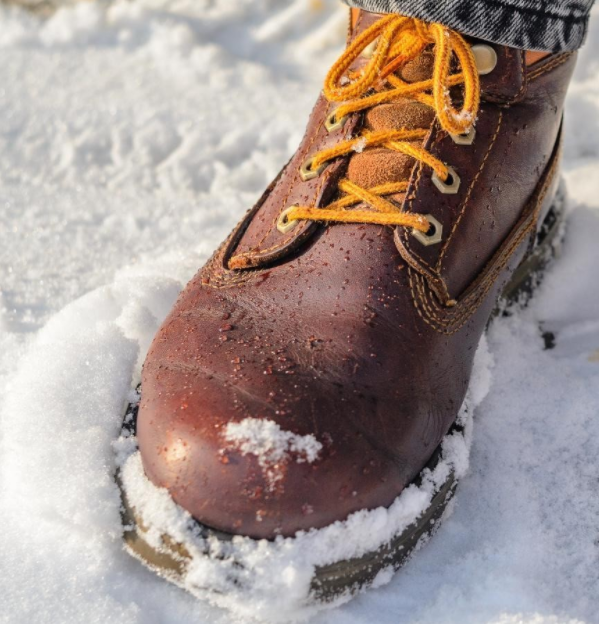
How Long Should Shoes Last?
When customers are buying shoes, their favorite question is, “How long will this pair of shoes last?” I always take my time to explain to them that it depends on a handful of factors, as you just read above. Also, it depends on what you use the shoes for and the type of them.
Read: Do Suede Shoes Stretch?
How Long Should Running Shoes Last?
It would be best if you replaced your running shoes every 300 to 550 miles. Brooks suggests you replace your running shoes between 300 to 500 miles, Asics between 450 to 550 miles, and Adidas between 300 to 500 miles.
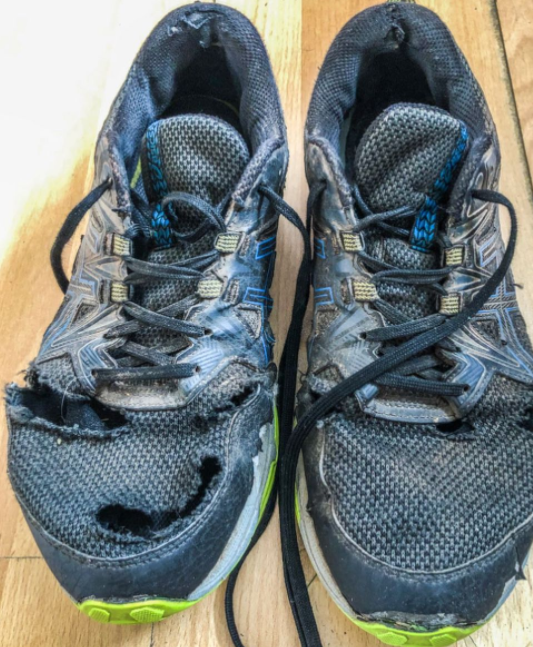
So if you run 10 miles per week, you will need to swap shoes after 30 weeks (when you achieve the 300 miles) or after 55 weeks (when you reach the 550 miles). Some people will say you need to change your running shoes after six months, but if you run 50 miles per week (just an example), you need to change your running shoes every six to eleven weeks. So base the change on the miles and not on how long you have the sneakers.
The best way to judge the wear and tear is by checking out how much tread is left on your shoes. You definitely should replace your running shoes if you notice any of these issues:
- The sole has become smooth or rounded where it used to be flat;
- The shoe’s midsole has become compressed or broken at all;
- There are holes or tears in the upper or lining;
- You feel a lot of pain in your joints, knees, and ankles.
Read: Best Walking Shoes For Overweight People
It would be best if you only used your running shoes for running activities and nothing else. Don’t be like me that at some point was using my running shoes for work, gym, running, walking, and shopping.
How Long Do Tennis Shoes Last?
Tennis shoes can last between 45 to 60 hours, so if you play for around one hour per week, you need to change your sneakers once per year.
The Senior Manager Merchandising and Innovation for Asics say that, on average, a pair of tennis shoes should last one year. Still, it’s difficult to say because it depends on many factors that can influence the lifespan of a tennis shoe, like the surface you play on, how many times you are on the court, the climate, and your playing style.
To check if you should replace your tennis shoes if you notice any of these issues:
- The outsole is wearing out with the lines completely disappearing;
- The midsole is showing wrinkles;
- The grip is not that strong anymore;
How Long Do Hiking Boots Last?
Hiking Boots can last between 500 to 1000 miles, depending on the quality of the boots, the surface you walk, and for how long you do it.
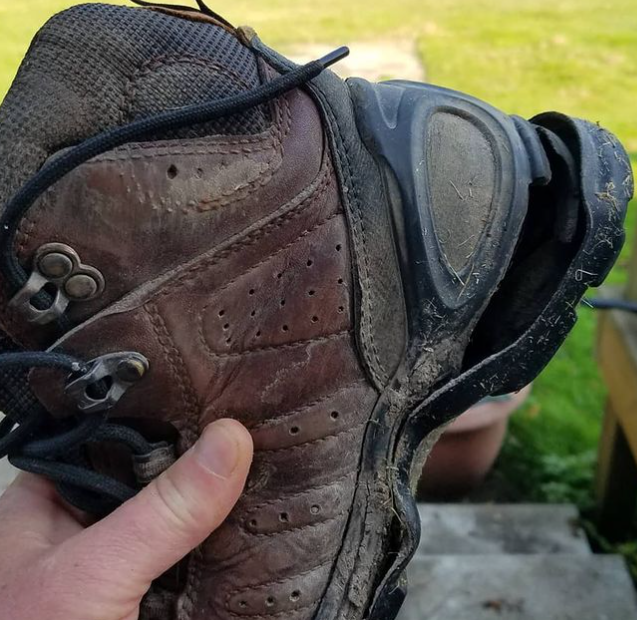
Trespass says that any walking shoe or boot with Vibram soles should last around 1000 miles. Let’s just state that 500 miles walked on concrete will wear soles down a lot more quickly than 500 miles out on the hills. The weather can also damage more your shows if you hike in the snow or it’s raining constantly.
You definitely should replace your hiking boots if you notice any of these issues:
- The soles are overly worn and the boots don’t grip to the surface properly;
- Boots are leaking;
- Cracks in the midsole that compromise cushioning and support;
- Broken eyelets and lace hoops prevent you from lacing your boots properly and cause blisters.
Read: How Much Do Shoes Weigh?
How Long Do Cycling Shoes Last?
Cycling shoes don’t have a specific lifespan, but the cleats should be replaced every 3000 to 5000 miles.
The cleats changing depends on the brand you are using, your riding style, your mileage, weather conditions, or how far you walk with them. Same cleats include a wear mark to indicate when you need to substitute them. You will replace the cleats many times before replacing your shoes, so how many times you cycle per week will be the main factor.
Since cycling shoes can last you years, I will mention the signs that indicate you need to replace the cycling cleats:
- The foot starts to feel sloppy on the pedal;
- The release from the pedal is becoming too easy;
- The springs show signs of wear like being polished, shiny, or there are any flats bits.
How Long Do Skate Shoes Last?
Skate shoes can last between two to four months if you skate for between 2 to 3 hours per day. Skate shoes can easily be worn out due to the tricks you perform. Some people even change skate shoes monthly because they skate for around five hours per day. So basically, it depends on how much you skate and the type of surface you are skating on.
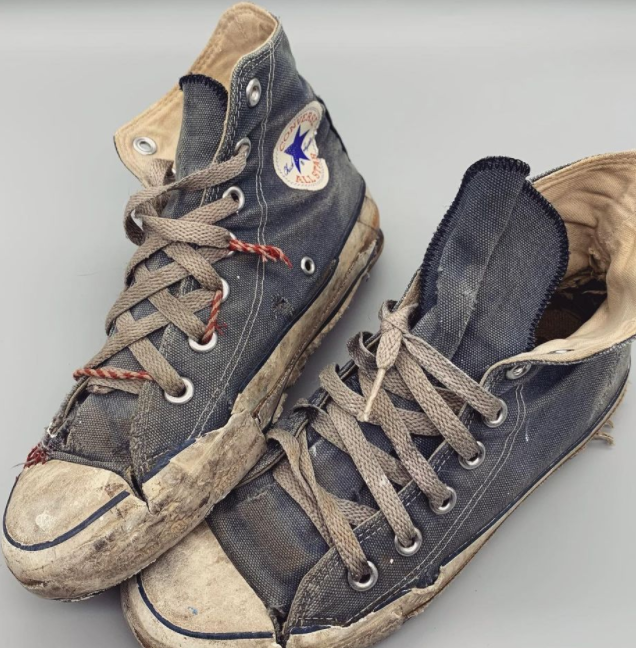
Vans says that skate shoes can last a month or a year, but based on what I read about people who skate a lot and what skaters share on Forums, the sneakers usually last two to four months (and four months is already a stretch on the shoes’ lifespan).
However, you really should replace your skate shoes if you notice any of these issues:
- The sole flaps every time you do a trick or walk around;
- Stitching has been ripped, holes on the shoes;
- The soles are out of grip, and the feet slide off the board;
- Your grip tape is injuring you.
How Long Should Golf Shoes Last?
Golf shoes should last between 12 to 20 rounds (one round typically consists of 18 holes), but it depends on the weather, the type of the shoe, and whether you walk or ride a cart.
So if you play one round per week, your golf shoes can last something from 3 months to 5 months. Spike shoes can give more grip to golfers but are also less durable because the spikes wear out quickly. So spikeless golf shoes tend to be more durable.
Replace your golf shoes if you notice any of these issues:
- You often slip during your swings or walking;
- You feel off-balance with your golf swings;
- The spikes are worn out;
- The water is getting inside of your shoes.
How Long Do Shoes Last In Storage?
Shoes can last in storage for many years (maybe 5 to 6 years?), but the material may change its feel and durability. The way the shoes were stored and the material will determine how long they can last. Shoes stored in a dry place with low humidity are more likely to maintain their feel better than if they were stacked on top of each other or wet.
Read: Difference Between Loafers and Dress Shoes
Also, leather material will be more durable than synthetic materials. The color may fade, but this will not affect the durability. I have worked in shoe stores for six years, and I remember one pair of leather shoes in the store for all the time I have worked there. The color faded, but the shoes still seemed pretty good to be worn.
When Should You Throw Away Shoes?
All shoes have a limited lifespan. This is because every material used in a shoe has an endurance threshold beyond which it cannot go. Also, understanding the signs of worn-out sneakers will help you avoid future problems in the form of blisters, tendonitis, knee pain, heel pain, or other issues related to inadequate footwear.
Check The Outsole
The outsole, the bottom of the shoe, is the first place to show signs of damage and wear out. Check the sole of the shoe to see if it is worn down excessively in any area. If it is, you need to replace the shoes.
You can also put your shoe on a flat and even surface at eye level to check if the majority of the shoe is touching the ground. If it isn’t, this means the soles have become worn out.
Read: Are Vans Non-Slip?
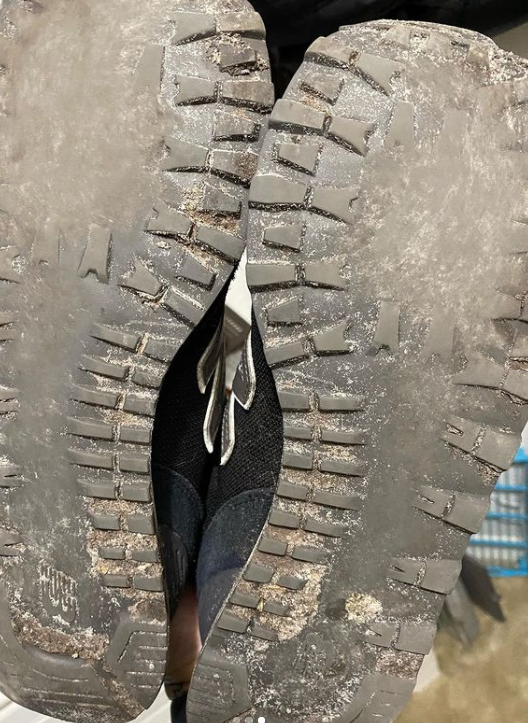
Check The Midsole
The midsole is the cushioning between the insole and outsole. If your sneakers have a removable midsole, you can check for deterioration of the shock-absorbing material. If you can see the underside of the midsole, if it has lots of cracks along with sagging and thinning, then it’s time to change it.
The worst thing you can do to your knees and ankles is keeping running, walking, or any activities where you need to jump with a pair of shoes without any cushioning and shock absorption because you will put all that pressure on them.
A good check you can make is trying a new pair of shoes on one foot and an older pair on the other foot. If you can feel a lot more cushioning in the new shoe, it’s time to throw the older pair away. Running shoes tend to have more cushioning than general shoes, so keep that detail in mind when comparing sneakers.
Check The Interior
Check the interior of your shoe to see if there are any problems with the material, stitching, and padding. If you can see the inside, you should look for signs of deterioration, like fabric rips, broken stitching, or thinning cushioning on top of your footbeds.
Check The Upper Wear
The upper wear is the part of your shoe that covers the toes and the foot. This particular area is more prone to weather damage since it directly faces sunlight, rain, and wind.
Check for any small tears and rips in the material, color fade, or loose stitching. Some materials like leather and rubber need more care than, for example, mesh.
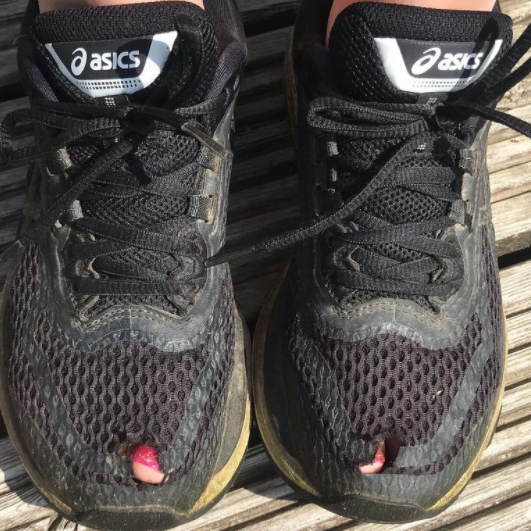
Check The Heel Counter
The heel counter is the little plastic part of your shoe’s back, which helps hold your heel in place and provides a little bit of extra support. If the material that composes it starts to break apart or deform, it means that you need to get rid of your shoes.
I always make a hole in the heel counter of almost every shoe, especially the ones I use to walk or run. I don’t seem to have this problem with formal or casual shoes. This occurs due to excessive heel movement in the shoes. Sometimes you don’t even notice, and it can be caused by more pronation on one foot than the other.
How To Make Shoes Last Longer?
Choose The Right Fit
The first thing you should do is choose shoes that fit correctly your needs and are well-cushioned for your activities.
Wear supportive shoes with good arch support if you have flat feet, high arches, or other foot problems. If you need more stability in the shoe, look for rigid soles and extra support on the sides.
Make sure you have at least half an inch of space for your longest toe when standing with your feet together in a new pair of shoes. You might need to give it a few wears before they become really comfortable.
Rotate Between Shoes
Always have at least two different pairs of shoes for each activity, and rotate between them. This will make them last longer by giving each pair time to recover from the wear and tear you inflict on them. This is especially important to shoes that you wear daily.
For example, if you love to run, have at least two pairs of running shoes that you can alternate. If you golf often, have two pairs of golf shoes and rotate them. You got the idea.
Take Care Of Your Shoes
For your shoes to last longer, you need to take care of them with the right products.
For example, I think many people just throw out or give away their old shoes when they are still in good condition. In reality, you can extend the life of your sneakers by using products designed to keep them in tiptop condition. Some products you can use:
Water Proofer Spray – Creates a barrier against water, stains, or any liquids.
Odor Eliminator Spray – It maintains your shoes fresh.
Cleanser Gel – To clean your shoe materials, remove any dirt or stains.
Read: How To Clean Skechers Shoes
Wear The Right Shoes For Different Activities
You want to wear the right shoes for suitable activities. For example, if you walk a lot, have a wide selection of walking shoes. On the other hand, if you’re more into running, choose running shoes. (I do defend the use of running shoes for walking because they provide more cushioning) Also, wear proper athletic footwear for sports like tennis, basketball, or football.
Do not wear golf shoes to go to the supermarket or tennis shoes to run. The number of customers that wanted to run in tennis shoes was out of control. They were cheaper than the running shoes. I also remember one customer that wanted to use its rugby boots for rugby and basketball (imagine the disaster).
Common Questions About How Long Should Shoes Last
These are some of the most common questions about how long should shoes last.
How Long Do Nike Shoes Last?
Nike sells many different types of footwear, from football to running, basketball, or golf shoes. As you read in this article, each sport or activity has a different lifespan that can last from two or three months to a couple of years.
If you ask how long a pair of Nikes will last for daily activities, that also depends on many different factors like your lifestyle, the way you walk, the weather, etc.
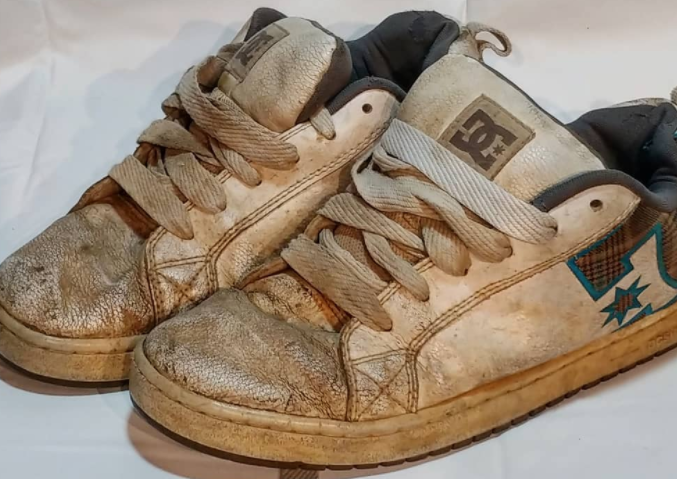
How Long Do Unworn Shoes Last?
Unworn shoes will last longer than used shoes. If you store them correctly, you can keep unworn shoes in good condition for five or six years. But, of course, it also depends on the quality of the shoes, the material, and the style.
How Often Should You Buy New Shoes?
You need to buy a new pair from the moment you see that your shoes have lost cushioning, support, have holes, make blisters, are uncomfortable, or don’t suit your needs anymore. Keep in mind that different brands and specific shoe styles have different lifespans.
How Long Do Expensive Shoes Last?
I got this question a lot when working in retail. People expect expensive shoes to last longer than cheaper pairs, and they are correct. The expensive shoes should last longer because they are made of better materials.
Read: Slides vs Flip Flops
However, the duration of the shoe depends on many other factors like the weather of the place you live, the type of shoe (we are talking about formal leather shoes, running shoes, or golf shoes?), the way you walk, where do you walk, for how long you wear the shoes, etc. Too many variables to think about.
Is It OK To Wear The Same Shoes Every Day?
Yes, it is OK to wear the same shoes every day. However, keep in mind that you will wear them out much quicker and need to buy shoes more often.
Conclusion About How Long Should Shoes Last
As you can see, answering the question “how long should shoes last” is not easy because you don’t have an answer that fits all.
There are many factors to consider, like the quality of the shoes, the way you walk, how long you wear the sneakers, where you walk, the weather, the activity, your lifestyle, etc.
You need to use the proper footwear for the suitable activity, and with time keep an eye on the shoes to decide if you need to replace them or not. One thing is for sure, if the shoes you are wearing don’t feel comfortable anymore, they have inadequate support, no cushioning, holes, and are tearing apart, it’s time to go shopping!
What about you? How long do your shoes last? Please share with me in the comments.
